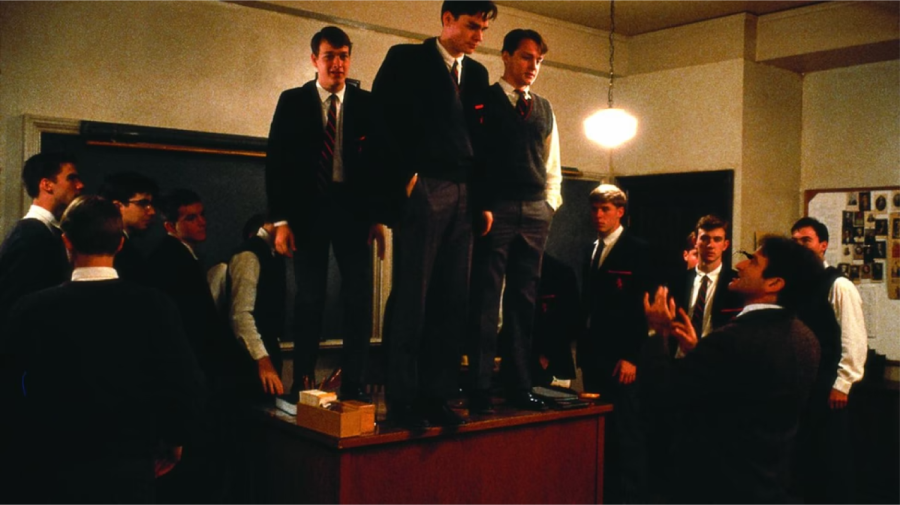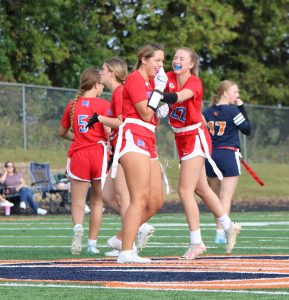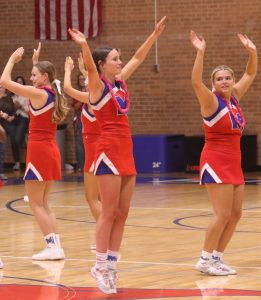Recipe for Rebellion: ‘Dead Poets Society’ is fully alive, despite being made in the late ’80s
Students should check out “Dead Poets Society” because it inspires individuality and free thought.
December 2, 2022
Put together angsty teenagers and a 1950s all male prep school and that’s a recipe for rebellion.
The story of the “Dead Poets Society” follows the life of seven boys, focusing on two: Neil Perry and Todd Anderson. Neil and Todd soon become friends on the first day, as they are roommates. The group tries to navigate the wild world of Welton Academy with a brand new teacher: Mr. Keating, a poetry professor with an eccentric side. Keating soon draws in the group of friends, who also include Charlie, Knox, Meeks, Pitts, and Cameron.
The audience learns right off the bat that Neil and his father have a strained relationship. Neil’s father controls all aspects of his life, including his career path. Most of the other boys in the friend group experience the same things as well. A great thing about the characters is how they each represent distinct personalities. Neil’s a dreamer, Todd’s cautious, Knox is the lovebird, Charlie’s the rebel, Meeks is the genius, and Pitts is the engineering buff, while Cameron is pretty uptight.
When the boys get to know Keating more, they discover he was a part of a club called the Dead Poets Society. Keating explains how the club would meet in a cave and read poems there. The group of friends decide to have meetings there like Keating and his friends did when they were students at Welton. What follows is a cornucopia of new discoveries for the boys. Neil tries acting, Knox falls in love, and Todd starts to come out of his shell. However, tensions rise when Welton staff and Neil’s parents find out about the club. Which brings the cruelty and pressure of the adults in the film to light. The film captivates how teenagers are not minds in which to shape, they are actual human beings with their own free will.
The beauty in this story is undeniable. Each of the boys are portrayed perfectly. Robert Sean Leonard (Neil) and Gale Hansen (Charlie) are two standouts. Leonard captivates Neil’s intelligence and stubbornness well with his natural tone that beckons the audience to keep watching. Hansen does a masterful job of showcasing the rebellious and fun-loving character that is Charlie. In a scene where he’s punished by the headmaster, Hansen’s laid-back façade is dropped and the audience is able to see a more vulnerable part of the character.
Robin Williams (Mr. Keating) also does a fantastic job. Williams, like most occasions, keeps the whole story moving. He shows the boys that their words and ideas matter, which is something that present-day teenagers can all find intriguing. Williams’ impact on the film industry is undeniable and that is shown through this film, not just with the character, but also because of the numerous impressions of celebrities that Williams does throughout the film.
Director Peter Weir and writer Tom Schulman effectively brought N. H. Kleinbaum’s novel to life. Weir and Schulman were both nominated for best director and best original screenplay, and Schulman took home the Oscar, rightfully so. Schulman’s dialogue is relatable, but at the same time new and exciting. It introduces new ideas to young people viewing the film. Schulman blends poetry with his own voice, almost creating a partnership between himself and Mr. Keating. Weir’s direction brings Schulman’s words to life with scenes that place the viewer right inside the halls of Welton.
To any young person feeling like the world is pressuring them to live a life that is not their own, they can be inspired by this movie to do what they love. Each character has relatability and is at a different stage of their life, which allows for the viewer to decide who they are, not be forced to be someone they are not. Who am I? That’s the question that “Dead Poets Society” tries to answer, and it responds with: “You are here/That life exists and identity/That the powerful play goes on and you may contribute a verse. What will your verse be?” A direct quote from John Keating, with some help from Walt Whitman’s poem “O Me! O Life!”, that will leave viewers questioning the very societal norms that stifle individuality. It’s worth a rematch for adults who grew up with it, and an eye-opening discovery for the youth of today.
Available for purchase on YouTube Movies, Google Play, Apple TV, and Amazon Prime Video







